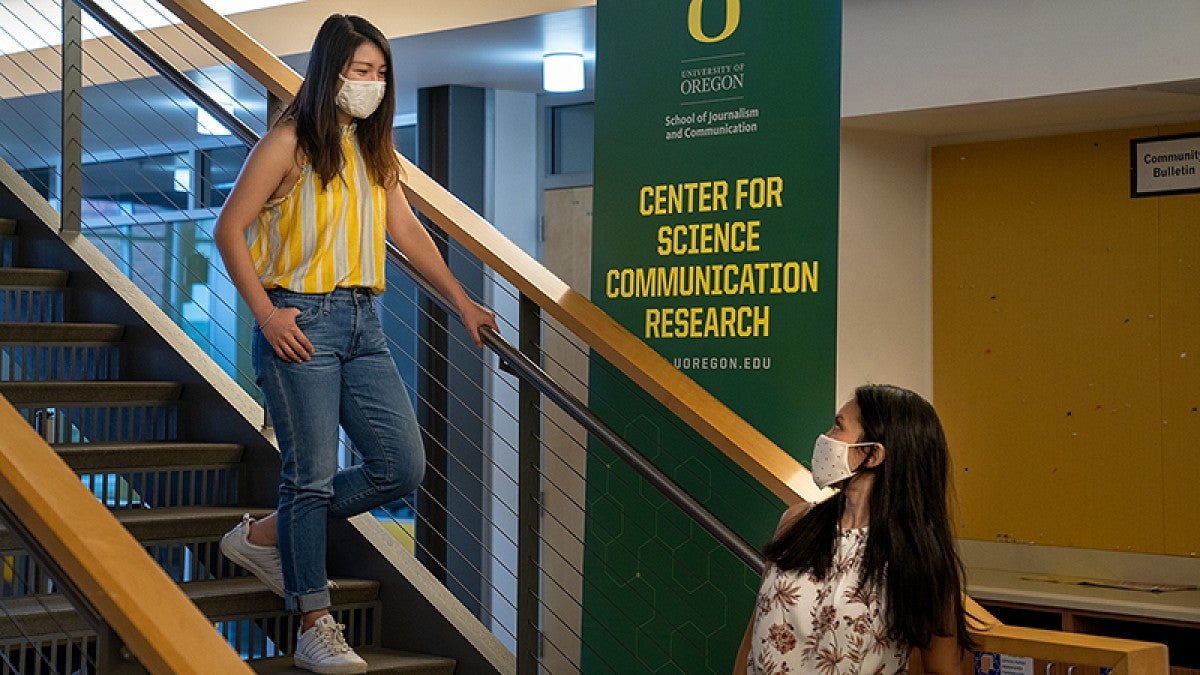One in four Oregonians say they’ll refuse the COVID-19 vaccine when their turn comes, according to UO researchers. Another third is still on the fence.
Thipkanok “Ping” Wongphothiphan, a UO School of Journalism and Communication doctoral candidate, wants to figure out how to change their minds.
It’s not just about ending the pandemic. Funded by a $2,000 grant from the Center for Science Communication Research, Wongphothiphan’s study on how vaccine-hesitant parents respond to different types of messaging could have wide-ranging implications. For example, it could help shift public conversations around climate change and other policy issues that pit science believers against conspiracy theorists.
“I think the implication is that after we know what type of information we should use to convince people who have high conspiracy beliefs, we can apply it to other topics in the future,” Wongphothiphan said.
She is one of seven UO student and faculty researchers to receive funding this year through the Center for Science Communication Research’s small grant program, which supports interdisciplinary research bridging the communication gap between scientists and the public. With awards ranging from $1,000 to $3,000, the program helps new researchers get their feet wet while encouraging seasoned researchers to take their work in new directions.
“Small grants are foundational to help jumpstart new areas of inquiry,” said David Markowitz, a grant recipient and assistant professor of social media data analytics in the School of Journalism and Communication. “They can help jumpstart data collection and provide a springboard for potentially larger grants as well. Quite often they provide the resources needed to get new ideas off the ground.”
Building on a previous study linking conspiracy beliefs with the tendency to process information emotionally rather than cognitively, Wongphothiphan’s research will test the effectiveness of narrative-based messaging versus statistical information on vaccine-hesitant parents. Although her research focuses specifically on the MMR vaccine, it could also inform strategies for persuading people to get the COVID-19 vaccine.
“What I expect to see is that people who are high in conspiracy belief would be able to process information through a narrative better than through scientific facts,” she said.
Psychology doctoral student Michael Silverstein helped shape the UO’s nationwide longitudinal study on perceptions of COVID-19 during the pandemic, which addressed how emotional processing informs risk perception and behavior. Now he’s using his grant to pivot and examine what motivates people to engage in rational deliberation when making decisions.
Specifically, he wants to know whether a person’s confidence in their ability to make the right decision affects their willingness to apply logical reasoning to a problem. While a lack of confidence can leave a person unmotivated to perform a task, too much confidence can be similarly demotivating, suggesting there’s a sweet spot somewhere in the middle.
“Let’s say, for example, you’re at the doctor’s office and it’s recommended that you start off a new treatment. But it if you don’t feel confident in that domain of medical decision making, you’re not going to engage in that process with the doctor at all,” he said. “On the other hand, if you have a solution that seems really simple but in reality is very complicated, you might not think hard enough about it to come to an accurate decision.”
Understanding the role of confidence in decision-making can help science communicators craft motivating messages to help people think through their decisions rather than follow their instincts, he believes.
Markowitz’s research will tackle another timely and divisive issue: the dehumanization of “outgroups.” After studying dehumanizing attitudes toward Asians and Asian Americans during the pandemic, he became curious about how the tendency to view outgroups as less than human relates to other immoral behaviors such as cheating and lying.
“Seeing one target as being less than human, or ‘less than’ in general, has been tied to a host of different factors, but not to one’s personal level of unethicality,” he said.
Part of the study will address how dehumanizing stories in the media might influence people’s ethical behavior as well, which could help news outlets better understand how their writing can affect readers’ decisions.
Markowitz wonders what happens if they read dehumanizing stories about a particular group. Does that have an impact on their unethical behavior?
By compiling various personality traits associated with dehumanization, he hopes to find a way to help mitigate its effects.
—By Nicole Krueger, School of Journalism and Communication


